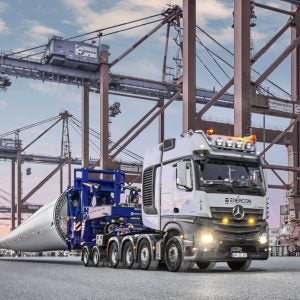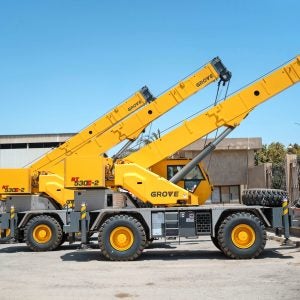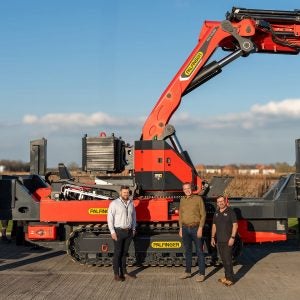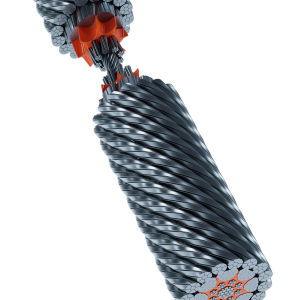Al Zahlawi came into the business of selling tower cranes from working as a technician. He says, “I’ve worked in tower cranes since 1974, and formed NFT in 1980. I worked on the technical side first, erecting and troubleshooting for Potain. In 1979, I moved into sales and marketing. NFT was based in Saudi Arabia for 15 years, until 1995. That year, I decided to expand the business and move to the Emirates, in order to cover more countries. We’ve been the main dealer for Potain in the Gulf for 25 years; we deal only with Potain.
“We’re a specialist company offering turnkey jobs, cranes with operators. We offer a choice of rental or sale and buyback. We also offer reconditioning of customers’ secondhand cranes.”
Today, NFT Cranes is widely recognized as one of the world’s leading tower crane companies. It claims to be the world’s biggest tower crane supplier and rental company, in terms of tower crane capacity. NFT considers its team to be field experts, with experience of top prestigious projects. It says it offers a wide range of products including the world’s smallest to largest Manitowoc Potain tower cranes and the world’s fastest PEGA Hoist, with a speed of 120m/min and capacity of 3.2t. With thirty years of experience, it has a growing asset base of 650 Manitowoc Potain tower cranes in the GCC, with 300 more around the world, and 200 hoists from GJJ/Orbit and Pega. With branches around the world, it says it is growing with unrivalled momentum.
For a few years, business in Dubai was as good as anyone could wish for. Al Zahlawi says, “During the boom, we caught an opportunity to sell and rent. We were importing from 500–600 cranes a year. We caught a lot of the best and most prestigious jobs in the area.
“Today, people are asking, ‘What else is there to be built in Dubai?’ So, we have to look to other markets.
“We want to aim for about 20–30% growth per year, based on our expansion in overseas markets. In Dubai, we expanded three times over in three years. But then, we suffered for some time from the drop in business. We don’t want to risk that again. We had to move cranes from the Emirates to Saudi Arabia and elsewhere. We had two big projects in Riyadh, which helped us survive: the Princess Nora bint Abdulrahman University, which took 150 cranes, and the King Abdullah Financial District, which took 100 cranes.”
As well as looking back to NFT’s origins in Saudi Arabia, Al Zahlawi is looking further afield. He says, “Recently, we’ve moved into working in the Far East, in markets like Singapore and Hong Kong. We’re also working in Central Asia, in countries like Azerbaijan, and have a base in Ethiopia, from where we are also delivering cranes to other African countries.
“In Azerbaijan, we’re supplying passenger hoists for a residential project, and then tower cranes for some other projects. The business model of Dubai has moved to Azerbaijan, mainly around Baku. We can take our experience here and use it in other places like that.
“Iran is a promising market for us. We’re also in the Far East and Africa, which is new for us. We’ve been working there for a year now. We’re renting about 40-50 new cranes in Singapore.”
Al Zahlawi is also expanding his business into new end user sectors, both large and small. On the large end, he is focussing on energy-related jobs, using some of Potain’s biggest cranes. He says, “This year, we have started to put cranes in the oil and gas sector. We have about 25 cranes on a project in Abu Dhabi. It’s a new sector for tower cranes. They’re being used for erection and mechanical work.
“We offered a tower with 70m radius and 3t at the jib end. That’s comparable to a 250t mobile crane. The crane’s new variable frequency drive gives inch precision for placing loads.
“We have three Manitowoc special application MD1100 tower cranes available, and may go up to six to eight units in future. These can lift 7t at 90m radius. The MD1100’s normal maximum lift is 40t, but it can go higher, to 50t.
“There are three nuclear power plants coming up in Abu Dhabi. These cranes will go for jobs likes this.”
Tower cranes, Al Zahlawi believes, can compete with mobiles in the Gulf as well at the low capacity end of the market as at the high end. He explains, “ We’ve found a few jobs for self-erectors. They’re small, quick, fast, cranes. They’re good for building projects taking two or three months. They were previously unknown to this market. We’ve got eight units coming. You can erect them in a few minutes, so they are good for small housing projects and villas, where they can replace a mobile crane.”
Despite this inventiveness, there is still a glut of standard tower cranes in the market. One of Al Zahlawi’s latest additions to NFT’s services might be able to help customers with that. He explains, “We have a trade-in centre now; we can take in any used tower crane, and offer a Potain in return. There are a lot of secondhand cranes in the Gulf now that are getting old. In future, people here won’t invest in buying tower cranes, but will chose rental.
“The experiences here recently, have taught people not to invest for the long term. It is a nightmare to leave cranes on the ground. This is why we took the opportunity to move cranes out of the country. At the moment, we are moving more than 40 cranes around the world. The idea is to reduce our crane fleet by about 50%, and get more brand new cranes for rental.”






